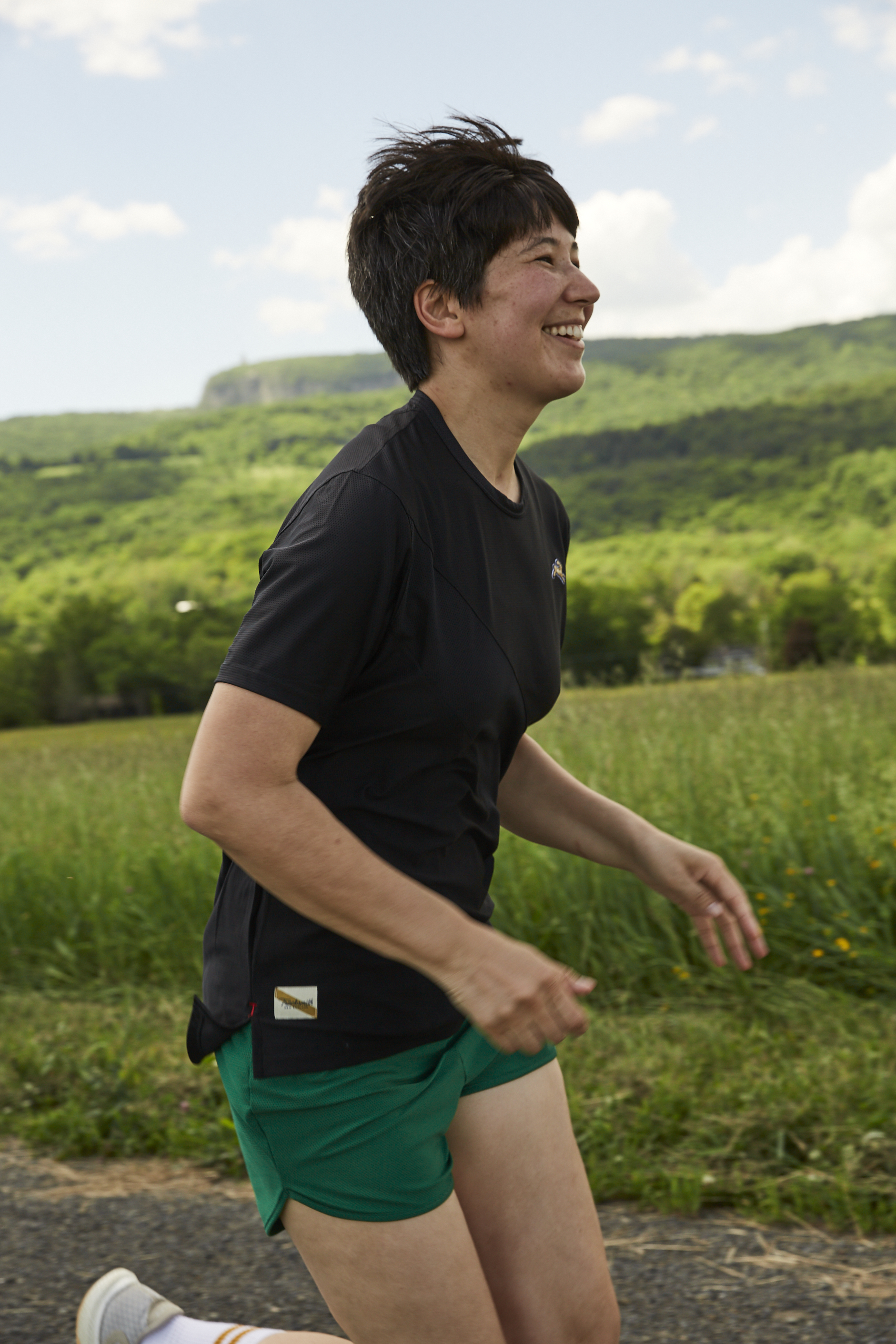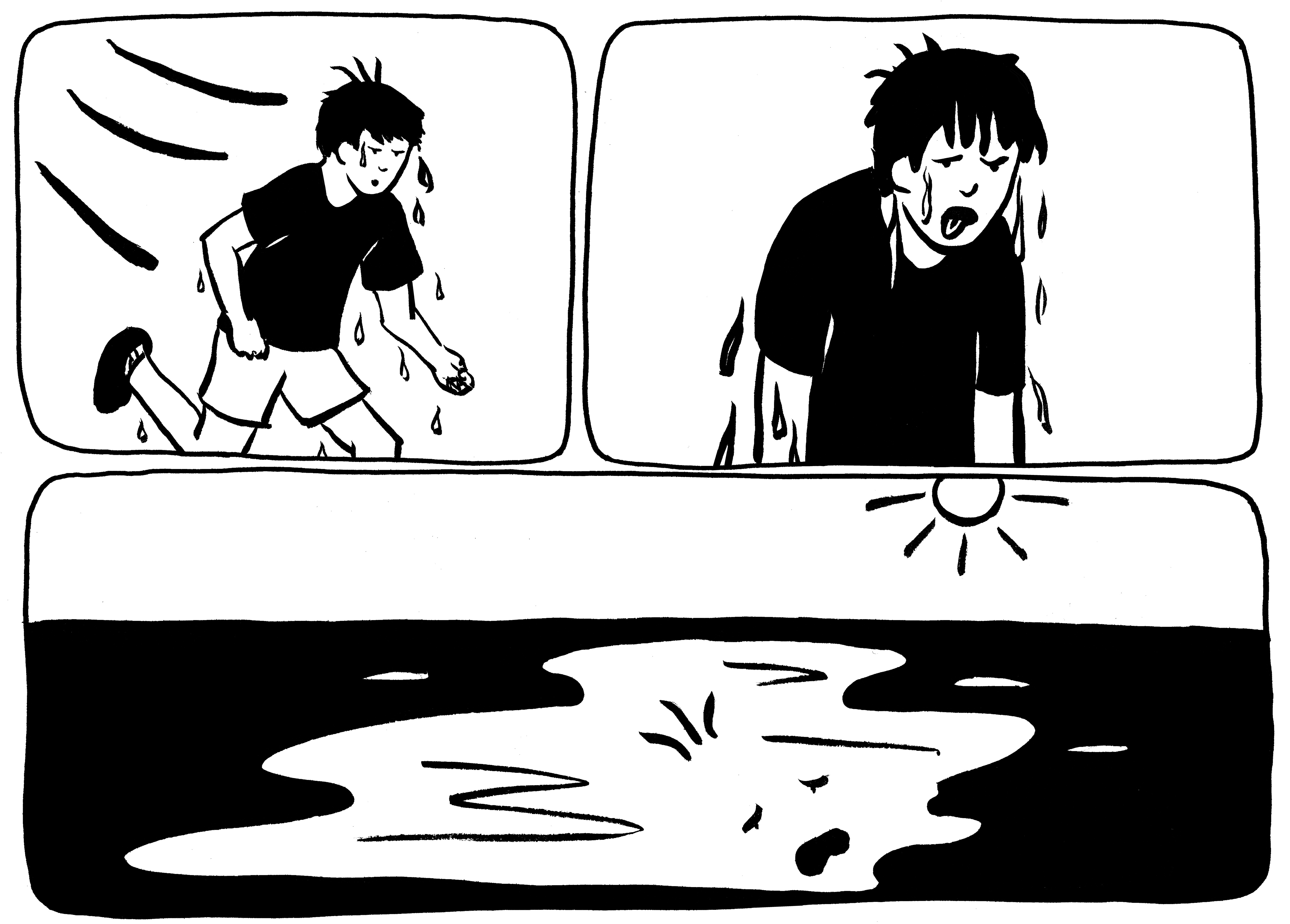I’d love to hear the origin story of how you started writing a memoir. What does writing mean to you?
Mylo: I had always wanted to do a graphic memoir. You don't have to be important. It's about reflecting the experience of being a human being. I like that comics are very accessible. When you have words and pictures together, you can immerse yourself quickly. And that medium is not overly pretentious. It's really for anybody.
Running has been such a big part of my life. It's not what I do for my job, but it's such a common thread. I'm not out there winning marathons. No one would say, ‘I need to hear your story about running.’ In a way, it feels like a relationship, a mentorship, running, knowing more than I do.
It's the only thing that can get through to somebody who's stubborn. Injury teaches us so much. Running has been such a space of learning. You can't help, but translate it to the rest of your life. You can't bulldoze your way through life, the same way you can't bulldoze through marathon training.
Having to dissect that relationship is also about understanding the relationship between me and my own body; which has sort of been fraught, but also amazing. Right now, there's just so much attention on transgender participation in sports and whether it should be even allowed. There's a whole narrative being missed about the relationship with your body that's developed through sports.
Some young people are getting the message that they're not allowed to be in sports at all. I think it's quite damaging. And the idea of winning. What does that really mean? What are we trying to win? The truth is people can be so passionate about sports. But we made sports up. We could make it up differently if we want to evolve. It's not a static thing. It's just like language; there are language rules, and they can be broken because we made up what those rules are.
I've had a goal to do a memoir since 2010. I was doing a lot of one-off comics and shorter pieces and kind of building up, getting to the place where I was like, ‘Okay, I can do a full length.’ I never started the full length because you have to spend years doing that. I only have one year [as a Tracksmith Fellow], but I think I can get a good amount done. It's possible. I don't think I would have been able to do that if I hadn't seen the fellowship and thought, ‘Oh, I do have this is the story I wanna tell.’

Do you have a rough narrative thread that you feel comfortable to chat about?
Mylo: It’s very rough and it may change. With a disclaimer, I've been most in the uncomfortable place of finding out the ‘why’ behind so much of what I do of the story. Why do I feel compelled to run?
Under there, there are positive reflections of self and also negative. Running is not a linear activity, even though one could argue, it's the most linear activity possible. You start and then you stop. It could be a straight line, but the journey of relating to your body or improving your ability, even physically, is cyclical.
For instance, training plans ramp up and then you rest, then ramp up more. That’s actually the most natural and fastest way to the goal. It was important to me to not structure the story linearly. I'm thinking of grouping stories around types of runs, speed work and the long run and rest day being maybe the most important chapter of all.
Rest was not a part of running that I paid any attention to until I was injured for three years. I ran everyday in college. I would run farther and farther until I ran seven miles every single day, faster and faster. I thought you could just infinitely improve. Then I would get injured and then I would just start the same thing over. I did not learn my lesson.
It sounds like the content and structure is so much about coming full circle with things, iterating on things, rather than point A to point B. Could you talk more about your own journey of identity and what that is like?
Mylo: I thought my identity story connected to running because it's the same way I tried to manage my gender identity as a kid. I tried to manage my body through running. When I was young, I thought I could control my body with my mind. You have your body as a certain way and your mind as a different way. You think you'd have to decide which one is right.
I thought I could will puberty to never happen to me. I was wrong. I think with running, there's a sense of, “mind over body.” In a sense, you would feel the pain of running harder, but you could try to stay in your mind. That was something I was naturally good at – separating my mind from my body and existing separately from it. It ironically made me a better performer at that time in my life physically. I would feel pain, but I wouldn't really feel it. I thought it was a good thing. I can see now it was not. That relationship with running is so nuanced because it's not solely true that running was a way to control myself. It was also a place I experienced joy. It's not just one thing or another.
The media, now, is so different than when I was growing up. I was born in 1985 and grew up in the nineties. There was almost no visibility of transgender people, but especially no visibility of non-binary transgender people. It's frustrating to feel you have to see something to know that's who you are. But it wasn't until I met people who were more like me that everything made sense. It was so calming. I went through phases that were obvious to people around me but there wasn't enough communication; I did not want to wear dresses – I would have fights with my parents over this. I would want my hair cut shorter, but they wouldn't do it. I was so young and knew what I wanted to do and who I wanted to be, and was told again, ‘That doesn't fit. You can't do that.’ So you try to find another way to be, but it's hard to find another way to be.
How did you get more comfortable with being able to express who you are?
Mylo: Having language was helpful. I honestly didn't get language until after college. After I graduated high school, I felt like, ‘What do I do?’ This becomes a little more pronounced with folks who have gender identities that are different from what they were assigned at birth.
Throughout middle school and high school, I was perceived as someone who had a sense of personal style that was different. It was me trying to be myself. It looked very awkward. My pants were always too big because I didn't want to wear tight pants. But the only kinds of pants that were available at the time were flared pants. I didn't have a belt, so I used the safety pins and had this weird flap on the side. It wasn't a cute thing that was happening. I didn't feel excited about my appearance. It was hard for me to find clothes that I was excited about in any way. It's not such a deep thing to say, it's just the truth.
The truth is, after having the language, I don't know I changed that much. I just understood more. I'm not failing at being a woman. I'm just being myself. I was already wearing androgynous clothes. I cut my hair a little shorter, but my behavior hasn't changed. It's just that I feel more justified instead of feeling like I'm messing this up.
Or feeling you have to play a role or something and you can actually just be what feels natural.
Mylo: It's so interesting because a lot of the writing, especially the most famous writing on genders, is often about gender as performance, how all gender is performed. I don't feel like I'm performing. I've been trying not to perform my whole life. That's why I don't like to dress up in costumes or dress up for Halloween. I had to dress up a bunch in my life. I'm just done. I don't like to play pretend.
That’s understandable. Maybe that's where running comes in? On one hand, it’s a performance, but on the other hand, it's complete raw self-expression where you’re confronted with a lot of physical pain. And it's how you respond and sit with it. That doesn't feel like a performance at all. There are so many different ways to approach running and connect with your body and how you relate to it.
Mylo: Running is so simple. Actually being yourself is so simple too. It's also a bottomless pit of discovery. I can run anywhere. You just need shoes. It's very natural for people to do; people have been doing it since they were people.
Going forward, what do you hope people take away from your project/story?
Mylo: Peace. That's what I want people to feel when I make music too (Their latest EP releases on 6/17). There’s usually both good and bad in what I make, and an acceptance of both creates peace because you can't avoid having a life that has both those things. Acceptance at times of the imperfections of life is something that can bring some grounding. I try to put into all of my work that life isn't so weird and hard.
There was a time when I felt invincible. I was running faster and I was getting better and felt stronger. I felt control of my life and my body. That was all taken away for three years while I was injured. I thought I was literally gonna die. Then you realize, you can't control anything. It doesn't mean life's not worth living. I think running is something where in the beginning, it rewards you for holding something too tightly, but you can't keep going like that. Then you're bludgeoned by reality and forced to practice flexibility.

To learn more about Mylo's music and writing visit: mylochoy.com.



